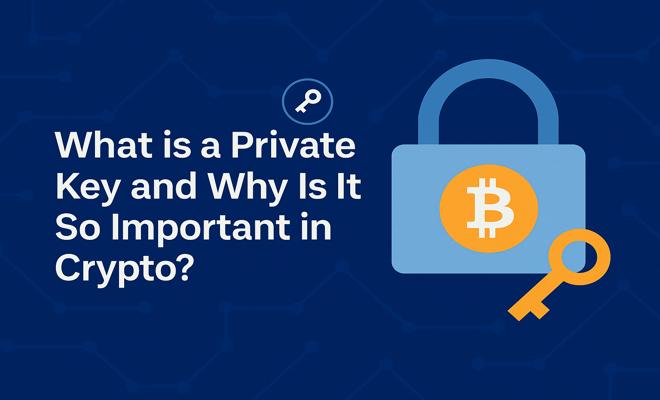
What is a Private Key and Why Is It So Important in Crypto? 🔐
In the fast-moving world of cryptocurrency, two things matter above all else: control and security. At the heart of both lies the private key — a fundamental concept every crypto user must understand. So, what exactly is a private key, why is it so important, and what could go wrong if you're not careful with it? Let’s break it all down. 🧠
📘 What Exactly Is a Private Key?
A private key is a long, randomly generated string of letters and numbers — essentially your password to access and control your crypto funds. Without it, you can't send or manage your assets.
It’s cryptographically linked to a public key, which acts like your wallet address — safe to share for receiving funds. But your private key? Keep it secret. 🔐
Private keys are typically 256-bit, meaning there are more possible combinations than atoms in the universe. That’s seriously secure — as long as you don’t expose it. 🔏
🔑 Private Key vs Public Key: What’s the Difference?
- Public Key: Acts like your crypto address. You can share it to receive funds.
- Private Key: The master key to prove ownership and authorize transactions. Never share it.
The relationship is one-way: you can create a public key from a private key, but you can’t reverse-engineer the private key from the public one. That’s what makes it secure. 🛡️
💼 How Private Keys Work in Wallets
When you set up a crypto wallet, it automatically generates your private and public key pair. These are used to create your wallet address and handle transactions.
Types of wallets include:
- Software Wallets: Apps like MetaMask, Trust Wallet, or Exodus.
- Hardware Wallets: Physical devices such as Ledger or Trezor for offline storage.
- Paper Wallets: Physical printouts of your keys — old-school but effective if stored securely.
⚠️ Why Losing Your Private Key = Losing Your Crypto
There’s no password reset in crypto. If you lose your private key, you lose access to your assets. Period. 😨
Since no central authority controls the blockchain, no one can help you recover it. Real stories of people losing millions due to lost keys are all too common — like the infamous case of James Howells, who threw away a hard drive containing keys to 8,000+ Bitcoins. 💸
🛡️ How to Keep Your Private Key Safe
- Store it offline: Use a hardware wallet or write it down and lock it in a fireproof safe.
- Use a password manager: Only if it's encrypted and trustworthy.
- Don’t screenshot or email it: Those can easily be hacked or leaked.
- Create multiple backups: And store them in different secure locations.
- Use multisig wallets: They require multiple keys to authorize transactions — great for extra protection. 🔐
🔐 Custodial vs. Non-Custodial Wallets
One of the biggest choices in crypto is deciding who holds your private keys:
- Custodial Wallet: A third party (like an exchange) holds your keys. Easier to use, but less control.
- Non-Custodial Wallet: You hold your own keys. More secure, but also more responsibility.
“Not your keys, not your crypto.” This popular saying in the crypto world reminds us that whoever holds the keys, holds the coins. 🗝️
🔒 Best Practices for Crypto Security
- Always double-check wallet addresses before sending crypto.
- Watch out for phishing attacks — fake websites and emails are everywhere.
- Enable 2FA (Two-Factor Authentication) on exchanges.
- Audit your wallets regularly and monitor for suspicious activity.
- Keep your apps and wallets updated to fix any security holes. 🔧
🔍 Bonus Tips for Crypto Beginners
If you’re just starting out:
- Practice using small amounts of crypto first.
- Try testnets to get familiar with wallet features safely.
- Understand your seed phrase (those 12–24 words you get with many wallets) — protect it like gold! 🪙
✅ Final Thoughts: Your Keys, Your Crypto
Your private key is your proof of ownership in the decentralized world of crypto. If you control the key, you control the crypto. It’s that simple.
Take the time to secure and understand it — because in this space, responsibility equals power. 💪
Want to keep learning? Check out more beginner-friendly guides and tutorials right here on BitMedia24 to level up your crypto knowledge! 🚀